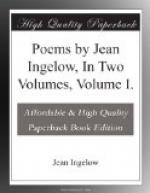I pray you, what is the nest to me,
My empty nest?
And what is the shore where I stood to see
My boat sail down to the west?
Can I call that home where I anchor yet,
Though my good man has sailed?
Can I call that home where my nest was set,
Now all its hope hath failed?
Nay, but the port where my sailor went,
And the land where my nestlings
be:
There is the home where my thoughts are sent,
The only home for me—
Ah
me!
A COTTAGE IN A CHINE.
We reached the place by night,
And heard the waves breaking:
They came to meet us with candles alight
To show the path we were taking.
A myrtle, trained on the gate, was white
With tufted flowers down shaking.
With head beneath her wing,
A little wren was sleeping—
So near, I had found it an easy thing
To steal her for my keeping
From the myrtle-bough that with easy swing
Across the path was sweeping.
Down rocky steps rough-hewed,
Where cup-mosses flowered,
And under the trees, all twisted and rude,
Wherewith the dell was dowered,
They led us, where deep in its solitude
Lay the cottage, leaf-embowered.
The thatch was all bespread
With climbing passion-flowers;
They were wet, and glistened with raindrops, shed
That day in genial showers.
“Was never a sweeter nest,” we said,
“Than this little nest of ours.”
We laid us down to sleep:
But as for me—waking,
I marked the plunge of the muffled deep
On its sandy reaches breaking;
For heart-joyance doth sometimes keep
From slumber, like heart-aching.
And I was glad that night,
With no reason ready,
To give my own heart for its deep delight,
That flowed like some tidal eddy,
Or shone like a star that was rising bright
With comforting radiance steady.
But on a sudden—hark!
Music struck asunder
Those meshes of bliss, and I wept in the dark,
So sweet was the unseen wonder;
So swiftly it touched, as if struck at a mark,
The trouble that joy kept under.
I rose—the moon outshone:
I saw the sea heaving,
And a little vessel sailing alone,
The small crisp wavelet cleaving;
’Twas she as she sailed to her port unknown—
Was that track of sweetness leaving.
We know they music made
In heaven, ere man’s creation;
But when God threw it down to us that strayed
It dropt with lamentation,
And ever since doth its sweetness shade
With sighs for its first station.
Its joy suggests regret—
Its most for more is yearning;
And it brings to the soul that its voice hath met,
No rest that cadence learning,
But a conscious part in the sighs that fret
Its nature for returning.




